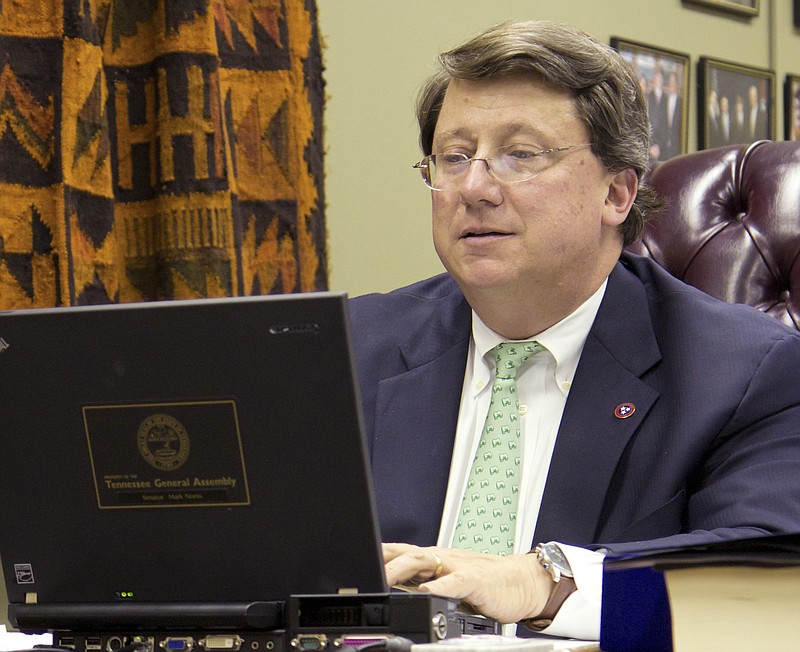NASHVILLE -- Gov. Bill Haslam's plan to extend health coverage to 200,000 low-income Tennesseans is encountering problems among some fellow Republicans in the Legislature, with Senate Majority Leader Mark Norris saying he has yet to decide whether he will sponsor it.
"I don't know yet," Norris said Wednesday.
Majority leaders typically carry a governor's package of proposals if they are of the same party.
"We understand the concept and the administration has put forth a plan that's worthy of consideration, but what form that takes remains to be seen," Norris said. "Until that quickens into something concrete, I can't say. I don't think there's much appetite for it, but I'm not quite sure what it is going to be yet."
Norris' indecision -- he says he needs more details and was recently somewhat critical over the governor's office's lack of communication with him -- illustrates the obstacles Haslam faces in persuading some majority Republicans to approve his Insure Tennessee proposal.
But not all Republicans are hesitant. House Majority Leader Gerald McCormick of Chattanooga said he's sponsoring the plan in the lower chamber.
"I think it's the majority leader's job to sponsor the (governor's) bills in the House," McCormick said. "I've done all of them before, and I don't want to stop now."
"If you look at the plan overall, it's a common-sense solution to a problem that we have and we can't get out of it," he said.
Noting that many of the uninsured wind up getting care at hospital emergency rooms, McCormick said, "We're already paying for these services. Somebody's got to carry [the resolution], and it might as well be the majority leader."
As for a floor vote, McCormick said, "I think it will be close."
Democrats are generally supportive of the plan.
Haslam's two-pronged pilot project seeks to use federal Medicaid expansion money under President Barack Obama's Affordable Care Act for what he calls a "market-driven" approach to health care.
One part would use vouchers that lower-income workers could use to buy their way onto their employers' health plan.
The other part is a retooled version of the state's Medicaid program, TennCare, in which enrollees would have health savings accounts and be subject to modest premiums and co-pays along with incentives to encourage healthier behaviors.
Earlier Wednesday, speaking to the Chattanooga Area Chamber of Commerce and Chattanooga and county government officials at a business breakfast, Haslam Chief of Staff Mark Cate said the proposal is "one of the most unique" plans nationwide and described it as being "in the direction of a block grant."
Cate urged attendees to look into the plan and contact legislators ahead of the Feb. 2 special session Haslam called to discuss the program.
"This is one where people do not need to sit on the sidelines. We need to engage," Cate said.
In Nashville, Norris sought to downplay his hesitation to sponsor the resolution.
"I think it's pretty clear the House will go first, and I think that helps us see which path forward is available to take," he said.
Senate Speaker Ron Ramsey, R-Blountville, a key player in getting Haslam's plan passed, told reporters he thinks most lawmakers "are just like me, trying to keep an open mind."
"I want to make sure we're not obligating future generations, that we know what it will look like five years from now and 10 years from now. I want to make sure there are some outs and relief valves if the federal government doesn't live up to its end of the bargain," Ramsey said.
The feds will pay 100 percent of the expansion through 2016. Then the state will begin picking up a share of costs, capped at 10 percent by 2020. Tennessee hospitals, desperate to see the program implemented, have pledged to put up the state's share by way of an assessment on hospital profits.
Regarding the overall plan, House Deputy Speaker Steve McDaniel, R-Parker's Crossroads, said, "Well, I'll tell you what. Somebody's going to have to show me something that's bad about it for me not to support it. From everything I've seen, I can support it."
But House Republican Caucus Chairman Glen Casada of Franklin said, "There's just several concerns that I have and my constituents have. ... It's an expansion of government. More people are dependent on government."
Secondly, he said, "we're going into partnership with a federal government that's on the verge of bankruptcy."
Contact staff writer Andy Sher at asher@timesfreepress.com or 615-255-0550.
